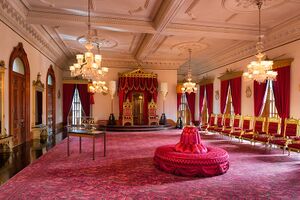Wyth Etholaeth
Wyth Etholaeth of the Kingdom of Lluthia | |
|---|---|
 | |
| Type | |
| Type | |
| Leadership | |
Earl Fendigaid Cynan since 1 September 2016 | |
Lwsie II since 24 March 1942 | |
| Structure | |
 | |
| Meeting place | |
 | |
The Wyth Etholaeth (Hen Sgript: ᚛ᚗᚔᚘᚓᚘᚑᚂᚐᚓᚘ᚜) or Eight Electorate is the upper house of the Cynulliad y Rhyddfreinwyr (Assembly of Freemen) of the Kingdom of Lluthia. Of the two chambers of the bicameral legislation, the Wyth Etholaeth exercises far lesser powers than the Senedd and is compromised of far fever members. Membership to the Wyth Etholaeth is granted by the Wyth Etholaeth, inheritance or the ruling monarch at the behest of the Wyth Etholaeth. It meets in the throne room of the Lauriane Palace in Northern Penntia. The monarch is most often present when the Wyth Etholaeth holds a meeting, however they have no say in the proceedings or decisions of the Wyth Etholaeth.
The Wyth Etholaeth is formed from six hereditary positions, two of whom are Ronnish mormaers with the remaining four being Lluthian earls, one elected position, the Jarl of Liliddinas, and the head of the Lluthian Church. Although the Wyth Etholaeth has the power to veto legislation, the last time it did this was in 1883. Instead of being a legislative chamber, the Wyth Etholeath mostly concerns itself in the affairs of the Monarchy leaving the Senedd as the de facto unicameral chamber of the Cynulliad y Rhyddfreinwyr. The most important objective of the Wyth Etholaeth is the election of a new royal family once the preceding one has reigned for a total of 3 kings' lifespans.
The Wyth Etholeath is older than any modern-day Lluthian institution. While the Senedd and the Monarchy derive their power from the people and God respectively, the Wyth Etholaeth derives its power from time immemorial meaning that it exists and will exist because it has existed. The first Lluthian records of the Wyth Etholaeth make remarks to the powers it already had. Some of the oldest records mentioning the Wyth Etholaeth are Setentrian and Hallanic accounts depicting a group of eight druids or chieftains choosing a successor to the throne. Most historians believe the Wyth Etholeath is around 2300 years old however, the Wyth Etholeath itself only began recording its proceedings in the mid 400s.